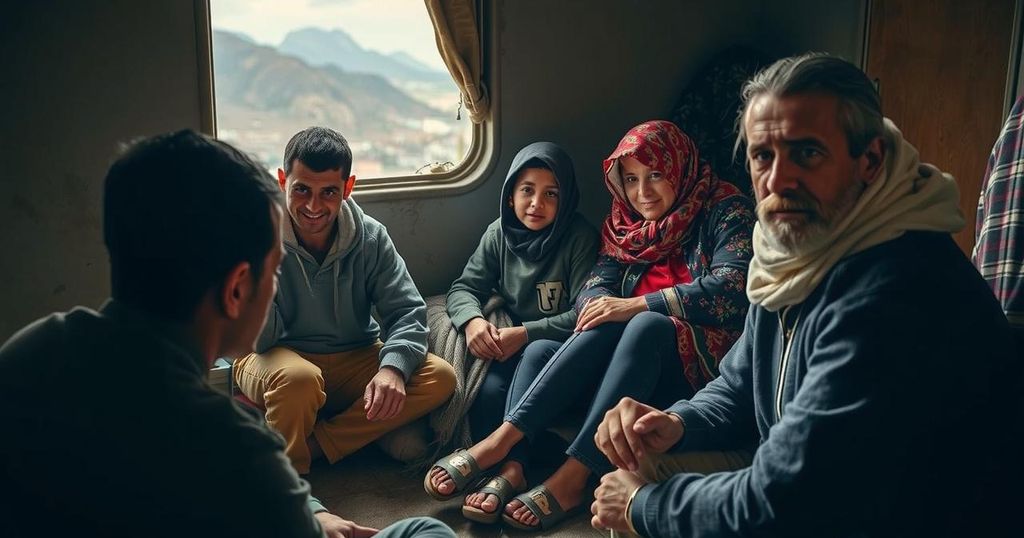Evacuated Bangladeshi Workers Share Traumatic Accounts of Israeli Strikes in Lebanon
This article recounts the harrowing experiences of Bangladeshi nationals forced to flee Lebanon amidst escalating Israeli airstrikes. Accounts from evacuees like Morium Begum reveal a perilous journey, while recent statistics indicate severe casualties and injuries among the Lebanese population as a result of these attacks. The plight of these workers remains complicated, as many struggle with the loss of homes and belongings amid bureaucratic hurdles in their efforts to return home.
In the wake of Israeli airstrikes, Bangladeshi nationals have shared harrowing accounts of their experiences while fleeing Lebanon. Morium Begum, a mother of two and a housekeeper in Nabatieh, recalls an overwhelming atmosphere of fear and destruction. “There were huge explosions everywhere and continuous bombing around me,” she recounted, explaining that conditions became dire, compelling her to seek refuge alongside other evacuees. They journeyed to Saida, where the Bangladeshi embassy and local NGOs have sheltered approximately 300 migrant workers. As a result of the escalation in violence, Begum became one of approximately 120 Bangladeshi individuals evacuated from Lebanon in recent days. After 14 years of work abroad, she returned to Bangladesh with little but her life. “I didn’t even get the chance to bring any clothes with me,” she stated, highlighting the abruptness of her departure. Tragically, she is uncertain about the fate of her home and belongings left behind. The Lebanese Health Ministry reports a grim toll of over 2,600 fatalities and more than 12,200 injuries due to Israel’s airstrikes targeting civilian areas and medical infrastructure this month. Shila Khatun, who worked as a domestic helper, also sought shelter in Saida after her workplace was destroyed, expressing, “I would have been dead if I stayed there for two or three days more.” However, even in Saida, safety is not assured. Khatun witnessed a bomb fall perilously close to her temporary shelter, describing the experience as “like hell on earth”. In her words, she was engulfed in despair, stating, “At one point, I lost all hope.” Many Bangladeshi nationals in Lebanon—estimated between 70,000 and 100,000, with a significant number lacking legal documentation—face difficulties in returning home due to airport closures and bureaucratic challenges. Similarly, Mohammad Uzzal, a restaurant worker from Nabatieh, expressed gratitude after being reunited with his employer who provided him with his passport and wages after they sought safety in Saida. He shared his fears, saying, “To me, this is like a second life,” as he reflected on the dangers he and his family faced.
The article centers around the experiences of Bangladeshi nationals during the recent Israeli bombardment of Lebanon. The recent escalation in violence has necessitated the evacuation of tens of thousands of foreign workers, particularly those from Bangladesh, many of whom work in domestic and service sectors. The humanitarian crisis has drawn attention to the plight of these individuals, with inadequate governmental support and chaotic conditions complicating their safe return home. The significant death toll and injuries reported reflect the targeting of civilian areas during military operations, raising concerns about the safety and well-being of non-combatants caught in the conflict.
In conclusion, the chilling accounts from Bangladeshi expatriates fleeing Lebanon highlight the devastating impact of the ongoing conflict and the precarious situation faced by foreign workers. While some have successfully evacuated, many still confront the challenges posed by unsafe conditions, bureaucratic complications, and the loss of their possessions. The testimonies of individuals like Morium Begum and Shila Khatun serve as somber reminders of the human cost of war and the urgent need for humanitarian support.
Original Source: www.arabnews.com




Post Comment